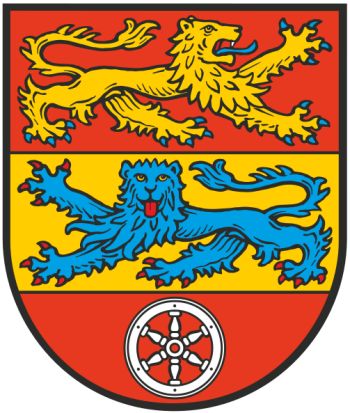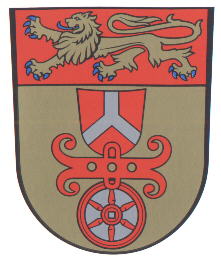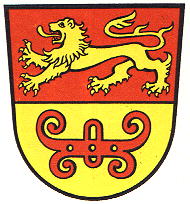Göttingen (kreis): Difference between revisions
Knorrepoes (talk | contribs) m (Text replace - "{|width="100%" style="color:black; background-color:#ffffcc;" |width="15%"|50 px|left |width="70%" align="center" |'''Heraldry of the World<br/>Civic heraldry of Germany - [[Deutsche Wappen|Deutsche Wappen (Gemeind) |
Knorrepoes (talk | contribs) m (Text replacement - "Additions :" to "Additions:") Tags: Mobile edit Mobile web edit |
||
| (26 intermediate revisions by the same user not shown) | |||
| Line 1: | Line 1: | ||
'''GÖTTINGEN (GÖ)''' | '''GÖTTINGEN (GÖ)''' | ||
State : [[Niedersachsen]]<br/> | State : [[Niedersachsen]]<br/> | ||
Additions : 1973 [[Duderstadt (kreis)|Duderstadt]], [[Münden (kreis)|Münden]] | Additions: 1973 [[Duderstadt (kreis)|Duderstadt]], [[Münden (kreis)|Münden]]; 2016 [[Osterode am Harz (kreis)|Osterode am Harz]] | ||
[[File:gottingen3.kreis.jpg|center|alt=Wappen von {{PAGENAME}}/Arms (crest) of {{PAGENAME}}]] | |||
{| class="wikitable" | |||
|+Official blazon | |||
|- | |||
|'''German''' | |||
| | |||
*(2017) Ein rot-gold-rot geteilten Schild. Oben schreitet ein goldener, blau bewehrter Löwe nach links, mittig ist er blau gefärbt, rot bewehrt und schaut den Betrachter an. Die Heraldik bezeichnet ihn deswegen als Leopard. Den unteren Bereich des Wappens ziert ein sechsspeichiges, silbernes Rad. | |||
*(1973) Unter rotem Schildhaupt, darin ein schreitender goldener blaubewehrter Löwe, in Gold durch einen Maueranker verbunden, oben ein roter Schild mit silbernem Göpel, unten ein silbern unterlegtes sechsspeichiges rotes Rad. | |||
|- | |||
|'''English''' | |||
| blazon wanted | |||
|} | |||
===Origin/meaning=== | |||
The arms were granted on June 1, 2017. | |||
The golden lion is taken from the old arms and refers to Göttingen, the blue lion is taken from the arms of Osterode am Harz and the wheel refers to the Eichsfeld region, to which part of the district historically belonged. | |||
The previous arms were granted on November 8, 1973. | |||
The arms were granted on November 8, 1973. | [[File:gotting2.kreis.jpg|center|alt=Wappen von {{PAGENAME}}/Arms (crest) of {{PAGENAME}}]] | ||
The arms show in the upper part the Welfen lion, as a common symbol for all three former districts. The lower part shows the anchor from the old arms, combined with the small shield derived from the Münden arms, and the wheel from the Duderstatadt arms. | The arms show in the upper part the Welfen lion, as a common symbol for all three former districts. The lower part shows the anchor from the old arms, combined with the small shield derived from the Münden arms, and the wheel from the Duderstatadt arms. | ||
The | The first arms were granted on October 25, 1935. | ||
[[File:gottinge.kreis.jpg|center]] | [[File:gottinge.kreis.jpg|center|alt=Wappen von {{PAGENAME}}/Arms (crest) of {{PAGENAME}}]] | ||
The upper part of the arms shows the lion of the Welfen dynasty, Dukes of Braunschweig. The largest part of the district was part of the main possession of the Welfen dynasty since the 13<sup>th</sup> century. The lower part shows the arms of the Counts of Plesse, who ruled the northern part of the district until 1571. | The upper part of the arms shows the lion of the Welfen dynasty, Dukes of Braunschweig. The largest part of the district was part of the main possession of the Welfen dynasty since the 13<sup>th</sup> century. The lower part shows the arms of the Counts of Plesse, who ruled the northern part of the district until 1571. | ||
{{de}} | |||
{{media}} | {{media}} | ||
[[Literature]] : Stadler, 1964-1971, 8 volumes; Linder and Olzog, 1996 | [[Civic Heraldry Literature - Germany|'''Literature''']]: Stadler, 1964-1971, 8 volumes; Linder and Olzog, 1996 | ||
[[Category:Kreiswappen]] | [[Category:Kreiswappen]] | ||
| Line 27: | Line 45: | ||
[[Category:Granted 1935]] | [[Category:Granted 1935]] | ||
[[Category:Granted 1973]] | [[Category:Granted 1973]] | ||
[[Category:Granted 2017]] | |||
Latest revision as of 10:33, 28 January 2024
GÖTTINGEN (GÖ)
State : Niedersachsen
Additions: 1973 Duderstadt, Münden; 2016 Osterode am Harz
| German |
|
| English | blazon wanted |
Origin/meaning
The arms were granted on June 1, 2017.
The golden lion is taken from the old arms and refers to Göttingen, the blue lion is taken from the arms of Osterode am Harz and the wheel refers to the Eichsfeld region, to which part of the district historically belonged.
The previous arms were granted on November 8, 1973.
The arms show in the upper part the Welfen lion, as a common symbol for all three former districts. The lower part shows the anchor from the old arms, combined with the small shield derived from the Münden arms, and the wheel from the Duderstatadt arms.
The first arms were granted on October 25, 1935.
The upper part of the arms shows the lion of the Welfen dynasty, Dukes of Braunschweig. The largest part of the district was part of the main possession of the Welfen dynasty since the 13th century. The lower part shows the arms of the Counts of Plesse, who ruled the northern part of the district until 1571.
This page is part of the German heraldry portal Deutsche Wappensammlung |
Heraldry of the World |
|
German heraldry:
|
Selected collector's items from Germany:
|
Contact and Support
Partners:
Your logo here ?
Contact us
© since 1995, Heraldry of the World, Ralf Hartemink 
Index of the site
Literature: Stadler, 1964-1971, 8 volumes; Linder and Olzog, 1996














